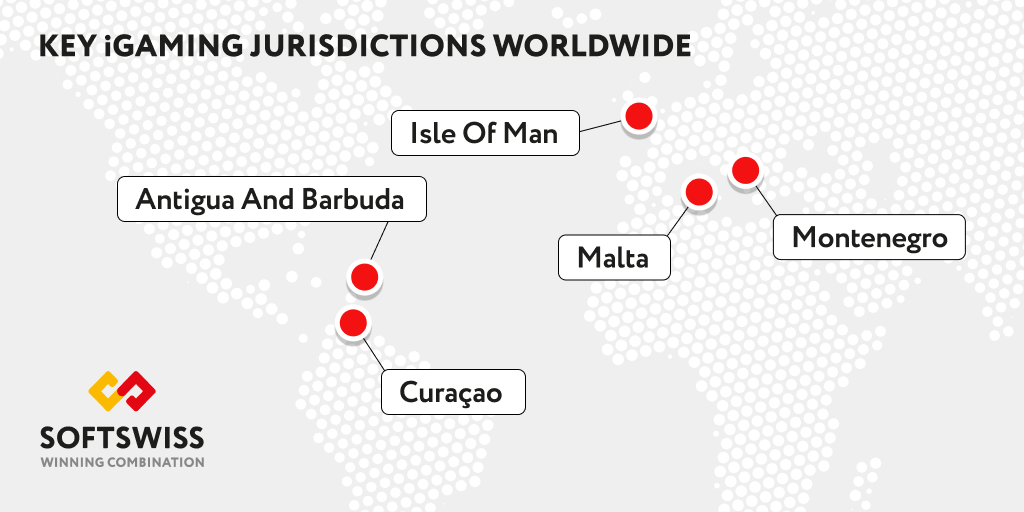Types of Gambling Licences
There are two kinds of licences that can be distinguished in online gambling: international, also known as offshore gambling licences, and internal, or country-specific gambling licences. International gambling licences fit projects aiming at larger market coverage, while internal licences allow an online casino to legally function within the borders of one specific country.
Among internally regulated gambling markets are the United Kingdom, Spain, Belgium, Bulgaria, Romania, Estonia, Portugal, Mexico and others. It is not rare for national regulators to require that not only the casino hold the respective internal licence, but also the gambling software provider.
There are quite a few international gambling jurisdictions, too. When choosing a jurisdiction, the main factors to consider are reputation, licensing requirements, complexity and duration of the application procedure, initial and annual costs, and taxes applied. Below is a brief overview of the most frequently chosen international gambling jurisdictions and the conditions they offer.
Popular iGaming Jurisdictions
Malta
Malta is known as a highly reputable EU gaming jurisdiction and is immensely popular with Europe-facing online gambling and betting operators. The application fee is €2,330 and then a licence fee of €8,500 is paid per annum. The gaming taxes are €4,660 per month for the first 6 months after the ‘go live’ date, and €7,000 per month thereafter. However, it’s important to keep in mind there are substantial legal expenses around the whole application procedure.
Application for a Maltese licence is a complicated and long process. All applicants must prove a good reputation and provide a detailed business plan to demonstrate an understanding of the business. A copy of audited accounts and personal profiles of shareholders should also be provided. The software platform behind the online casino must be rigorously audited by the Malta Gaming Authority for compliance with their various technical standards and policies.
Isle of Man
In the Isle of Man, the online gambling licence application fee is £5,000 (with a non-refundable upfront fee of £1,000) and £35,000 is paid annually. Gaming taxes vary between 0.1 to 1.5% depending on the turnover (gross gaming yield). The application procedure is quite extensive. Applicants must have a solid money reserve for payouts, prove to be reputable and offer fair gaming principles. The company shall be registered in the Isle of Man and the servers hosting the online casino should also be located there.

Antigua and Barbuda
Antigua and Barbuda is a respected but at the same time expensive gaming licence jurisdiction. There is a $15,000 non-refundable application fee and $100,000 is paid for an Interactive gaming licence, with a yearly renewal fee of $5,000. The application procedure lasts at least 60 days. A reserve of $100,000 is required before the casino starts operating. There are strict anti-fraud and money laundering regulations.
Montenegro
Montenegro is a relatively young gambling jurisdiction providing “all-in-one” services including licensing, merchant accounts, and company setup. The package fee is €22,500 with an annual renewal fee of €15,000.
Curaçao
Curaсao (Netherlands Antilles) is definitely one of the best options as it offers the most cost- and time-effective solution for operators. No wonder it’s a super popular jurisdiction for iGaming. The licence holding entity must be incorporated on Curaçao, which can only occur through trusted partners working with the Regulator. The process of incorporation and licence acquisition lasts several weeks and can be done remotely. Unlike some countries, Curaçao doesn’t require the casino servers to be kept on its soil, but regular database backups on a server physically located in Curaçao are still necessary.
SOFTSWISS provides assistance with Curaçao licence application to clients who chose to start an online casino on the SOFTSWISS gaming platform. The total costs, including company incorporation and gaming licence acquisition, paid to the regulator and Curaçao-based legal advisors range around $14,000 for the first year and $10,000 for each subsequent year.
Smart Alternative: Turnkey Casino
Starting and growing an online casino business is a significant undertaking, particularly when it comes to obtaining a gambling licence. For operators who have already successfully obtained their own licences and are ready to embark on a standalone operation, the Turnkey Casino Solution presents an ideal pathway.
This solution gives you complete control over your casino and sportsbook operations, allowing for a high degree of customisation and brand individuality. It’s a robust option for those who wish to maintain autonomy over their business while capitalising on expert support in areas like software support, game content integration, and day-to-day operational management.
To sum it up, whichever gambling jurisdiction you choose, careful consideration is needed to understand the requirements, complete the application, and liaise with the licensing body. The process demands significant time and a deep understanding of the legal aspects of gambling. For operators with their own licences, a standalone casino solution offers a comprehensive platform to start and grow your business efficiently, focusing your efforts on strategic development and market expansion.

